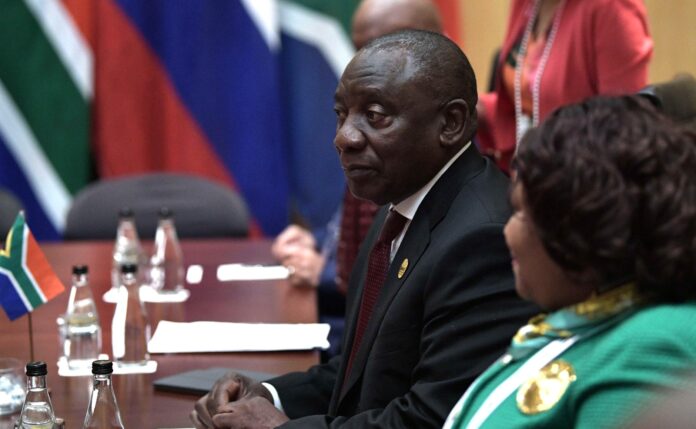Political analysts describe the expanded GNU cabinet as a shield to protect President Cyril Ramaphosa from impeachment amidst opposition scrutiny
President Cyril Ramaphosa has orchestrated the formation of a Government of National Unity (GNU) amidst growing threats of impeachment, bolstering his position with a diverse coalition of 10 opposition parties following the ANC’s loss of majority in the May elections. This move has expanded the Cabinet to a sizeable 32 ministers and 43 deputy ministers, aimed at accommodating various political factions and maintaining stability amid political turbulence.
Ramaphosa, addressing the nation’s economic challenges and social inequalities, emphasized the GNU’s commitment to fostering rapid, inclusive economic growth and social justice. The formation of the GNU, however, is viewed by political analysts as primarily defensive, shielding Ramaphosa from potential impeachment proceedings linked to the Phala Phala scandal.
Embed from Getty ImagesThe scandal, originating from allegations by former SA State Security Agency head Arthur Fraser, accuses Ramaphosa of financial misconduct and concealment of crimes related to his Phala Phala Farm. An independent parliamentary panel’s findings suggested grounds for impeachment, prompting calls from opposition parties such as the DA, EFF, and African Transformation Movement for Ramaphosa’s removal.
Despite initial opposition from the DA, which later reversed its stance under the GNU agreement, the EFF initiated a motion for impeachment during parliament’s recent session. Analysts like Sandile Swana argue that the enlarged Cabinet serves not only administrative purposes but also as a strategic bulwark against political adversaries seeking to destabilize Ramaphosa’s leadership.
Swana further elaborated that while the GNU’s optics may project unity, its underlying purpose is to safeguard Ramaphosa’s political survival and prevent the ANC’s ousting from power. The coalition, although touted for its inclusivity, faces scepticism regarding its operational efficiency and ability to deliver substantive reforms amidst internal power struggles and divergent policy agendas.
Analysis:
Political: The formation of the GNU underscores internal party dynamics and the strategic manoeuvring to safeguard Ramaphosa’s presidency amidst a fragile political landscape. It reflects efforts to consolidate power and mitigate impeachment threats through coalition-building, while also navigating complex inter-party relations and ideological differences.
Social: Public perception of the GNU varies, with some viewing it as a necessary compromise for stability, while others criticize it for prioritizing political survival over addressing pressing social and economic issues. The coalition’s ability to effectively govern and unite divergent interests will be crucial in determining its long-term societal impact.
Economic: Although economic growth and social justice are touted as priorities, the GNU’s effectiveness in implementing reforms and policies remains uncertain. Economic stability hinges on the coalition’s ability to coordinate disparate agendas and deliver tangible outcomes amidst broader economic challenges and public scepticism.
